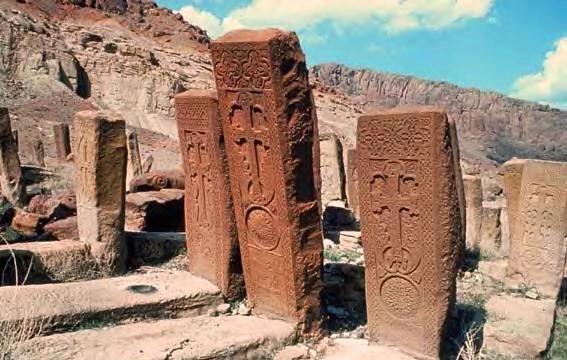Grief and Courage in Nagorno Karabakh
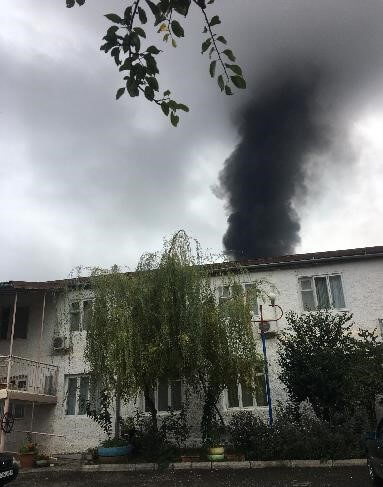
SPECIAL VISIT REPORT
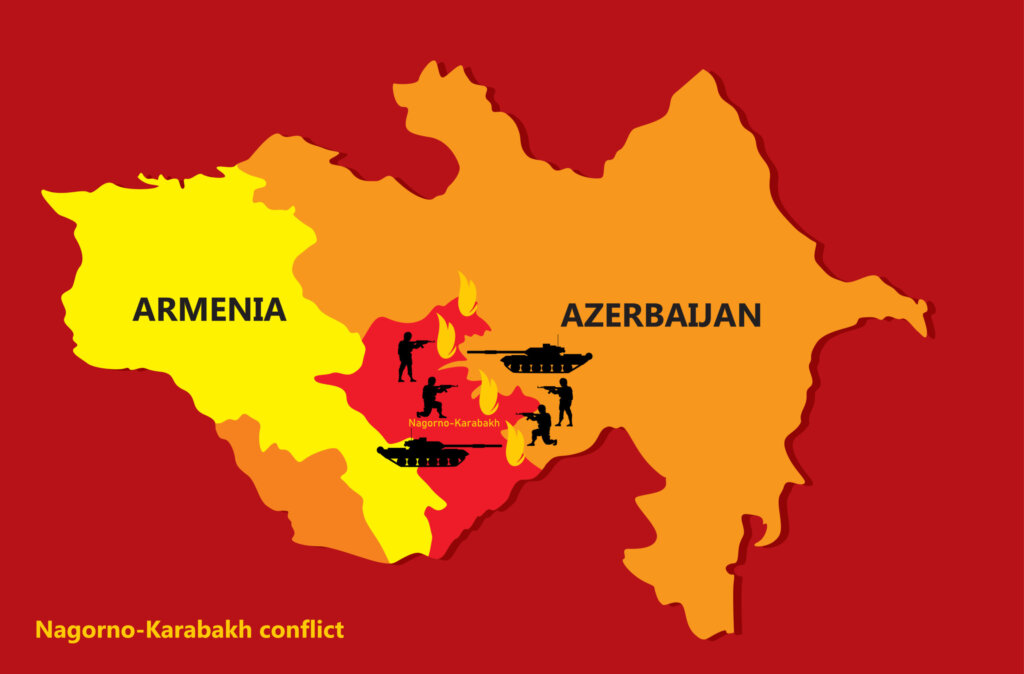
Humanitarian Aid Relief Trust (HART)
November 2020
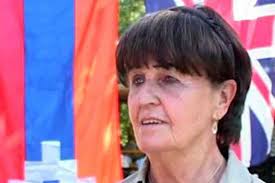
Contents
Foreword page 1
Summary page 3
Background page 4
Humanitarian aid page 13
Survivor testimonies page 16
Meetings page 17
Recommendations page 20
Acknowledgements page 22
Appendix: Self-determination page 23
Foreword: The Spirit of Armenia
By Baroness Cox and Revd David Thomas
We always say about the people of Nagorno Karabakh that they do not just survive; they create beauty from the ashes of destruction. Even during these darkest days of war, it has been humbling and inspiring to witness the ‘Spirit of Armenia’ rising like a Phoenix from the ashes of death and destruction, as the people share the love of their land, their history and their rich culture of music, dance and art. All this within the context of the breath-taking beauty of their land’s rugged mountains, thick forests, fertile valleys and crystal rivers.
During a poignant visit to Dadivank Monastery – on the penultimate day before the area was handed over to Azerbaijan – we spoke to three sisters who requested a photo with us. They asked if we were smiling for the photo. “No”, we replied. “Then we must take it again”, one of the sisters said, “this is God’s place. We must be happy here.”
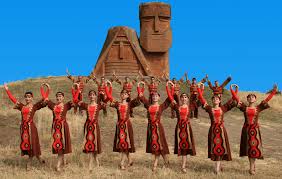
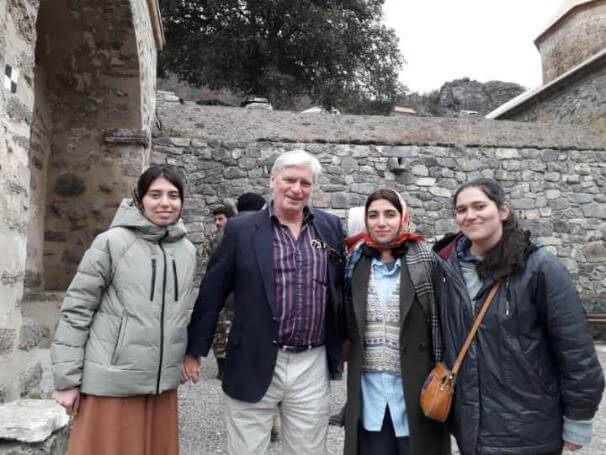
David Thomas smiling alongside the three sisters visiting Davidank Monastery for perhaps the last time.
We also visited refugees being accommodated in church buildings in the town of Saghmosavan, close to the Armenian capital, Yerevan. They described their intense suffering caused by loss of loved ones or not knowing their whereabouts, as well as their despair at the prospect of destitution, with no knowledge of how they are going to survive and care for their families. As we wept together, a 12-year old boy sat down at a piano and began to play beautiful music. We were profoundly moved by his talent and by the community’s commitment to maintain their precious culture amidst their overwhelming loss.
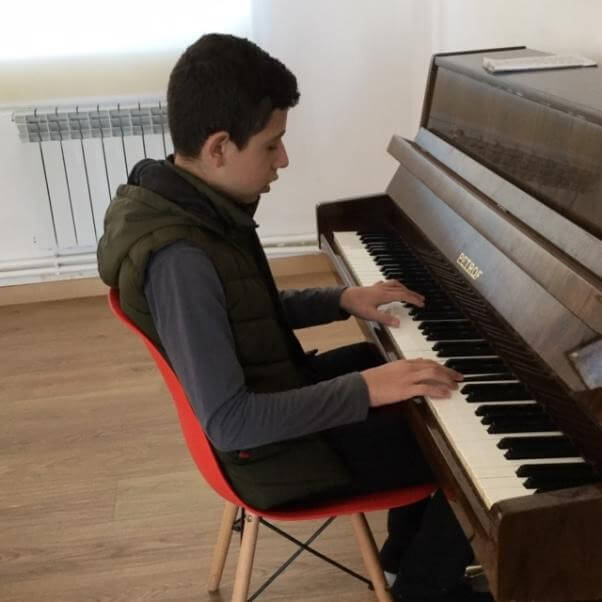
A 12-year-old boy from Nagorno Karabakh, now in Armenia, plays the piano after being forced to flee his home.
During the previous war, in the early 1990s, we visited Bishop (now Archbishop) Parkev Martirosyan in Stepanakert. Azerbaijan was firing 400 GRAD missiles every day onto Stepanakert. One morning, a missile hit the Bishop’s home. Every morning when the bombing started – in the depth of winter in the cold and the dark (there was no electricity) – the Bishop would get up to pray. On that morning, just a minute after he got up to pray, a missile hit his home and a concrete slab landed on his bed. His life was literally saved by prayer! We visited a few hours later to convey our sympathy. He was standing in the still smouldering ruins of his home, obviously is a state of shock. We asked him if he had a message for the Church, for the world. I will never forget his words. He could not have had time to prepare a speech, but his spontaneous message is so profound:
“We thank God that, after 70 years of Soviet Communism, we are free to pray again – in cellars and the field of battle defending the lives of those who are near and dear.
It is not only the perpetrators of evil who commit sin, but those who stand by, seeing and knowing – but who do not condemn it or try to avert it. We have a Gospel of love. Whatever demonic forces are at work, not only in this war but anywhere in the world, we must never hate; we must still love – we must always love.”
We are grateful for all who endured the pain of sharing their grief and anxieties with such courage and grace.
Summary
On 27 September 2020, Azerbaijan and Turkey launched a joint-military offensive against the civilian population of Nagorno Karabakh. A ceasefire was agreed after 45 days of fighting, but serious humanitarian and security concerns remain, especially in the context of COVID-19.
We visited Nagorno Karabakh to deliver aid to our partners at The Lady Cox Rehabilitation Centre. We also held meetings with refugees, human rights experts and the Presidents of Armenia and Nagorno Karabakh. While it was only possible to meet a limited number of people and therefore obtain limited evidence, the consistency of the information and the experiences of those whom we met is inherently disturbing.
Reports of Azerbaijani-Turkish military offensives
- Targeted civilian attacks with tanks, helicopters, drones, heavy artillery, cluster bombs and multiple-launch rocket systems, including Smerch, in breach of international humanitarian law and Geneva conventions.
- Large-scale damages to residential buildings and schools, as well as to infrastructure vital to the survival of the civilian population, such as bridges, electricity, communications, gas and water supply systems.
- Torture and atrocities, with ongoing reports of brutality inflicted on military and civilian prisoners, including beheadings.
- An attack on a medical centre in Stepanakert, including a maternity and child hospital, plus heavy attacks against the peaceful town of Shushi, including the shelling of the world-famous Ghazanchetsots Cathedral.
- The recruitment of foreign mercenaries and Jihadist fighters from Syria and Libya transported from Turkey to Azerbaijan to fight against Armenians, with reports of others coming from Afghanistan and Pakistan.
- An escalation of hate speech and ‘Armenophobia’ organised by the Azeri state, promoted in school curricula, exacerbated by recent comments from President Aliyev, e.g. “I had said that we will chase them like dogs and now we did.”
- Reports of a block to international aid and humanitarian assistance by forbidding air transit across Turkey.
The scale and ferocity of these offensives has intensified the justifiable fear among local people – who are 94% Armenian Christians – of the possibility of ethnic cleansing from their historic land, with grave implications for the region. Early estimates suggest that several thousand have been killed and as many as 100,000 displaced.[1]
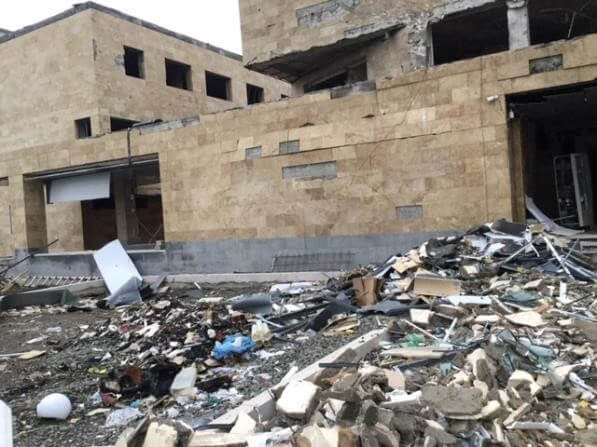
The aftermath of Azerbaijani bombing which targeted and destroyed this maternity hospital in Stepanakert.
We strongly support endeavours to protect civilian life in Azerbaijan and we grieve with those who are suffering in Ganja, Tartar, Barda and elsewhere. Yet we remain deeply concerned by the lack of international engagement with, and balanced reporting of, the suffering of civilians in Nagorno Karabakh.
Background
Nagorno Karabakh
The disputed territory of Nagorno Karabakh, known locally as Artsakh, is a historically Armenian region in the South Caucasus.
During Stalin’s divide-and-rule policy of the 1920s, the territory was given to Azerbaijan. As Soviet rule collapsed in the late 1980s / early 1990s, a referendum was held with an overwhelming vote for independence. Armenians have since established control of Nagorno Karabakh as a de facto independent state, with a functioning Government and viable economy, though its independence is not internationally recognised.
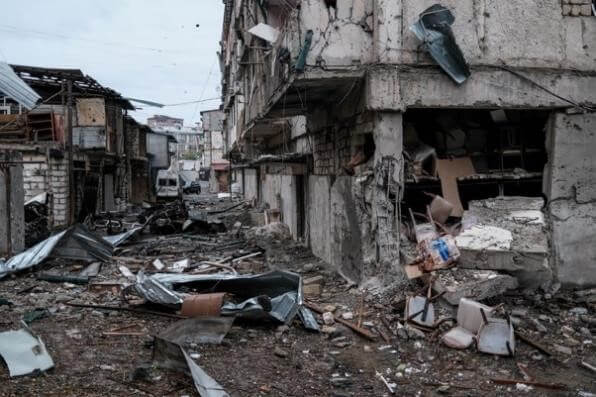
Another example of the damage caused by the indiscriminate Azerbaijani bombing of civilian areas.
History of oppression
Approximately 1.5 million Armenian Christians were victims of genocide in Turkey just over one hundred years ago.[2] Armenian Christians were also victims of an ethnic cleansing campaign in Nagorno Karabakh in the early 1990s and were targeted again by Azeri forces during the Four Days War in April 2016.[3]
In this context, attempts by some commentators to present the latest escalation of violence as an Armenian aggression – or to suggest that Armenia is as equally culpable as Azerbaijan for the violence and civilian destruction that has taken place – are manifestly untrue and dangerous. It would be entirely against the interests of Armenia to initiate the recent war.
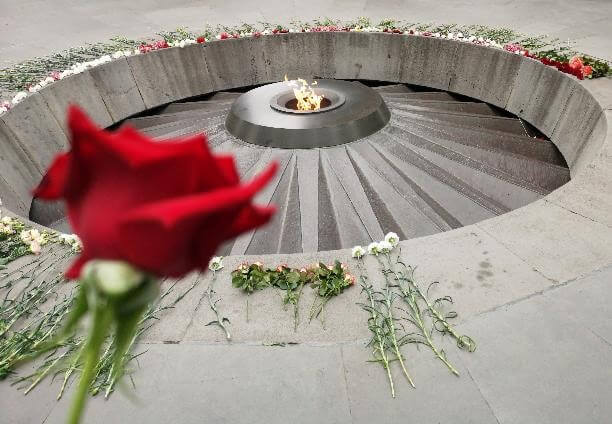
We visited the Armenian Genocide Memorial and Museum, located on the hill of Tsitsernakaberd, with panoramic views of Yerevan and Mount Ararat. The museum contains thousands of materials, academic papers, diaries, personal papers, photos of atrocities, memoirs, and testimonies of Genocide survivors.
According to a ‘Genocide Emergency Alert’ issued in October 2020 by Genocide Watch, Azerbaijan had reached stage 9, “extermination”, and stage 10, “denial” of the ten stages of the genocidal process.
The capture of Shushi
The town of Shushi (called Shusha by Azeris) is a strategically important settlement, which sits on a mountain overlooking Nagorno Karabakh’s capital, Stepanakert.
Shushi has a long and important history. From mediaeval times through to the 1750s, the town was the centre of a self-governing Armenian principality. In 1752, under Persian occupation the town became capital of the Karabakh Khanate, with a diverse population. It remained an important mixed cultural and trading centre for the Caucasus after being ceded to Russia in 1823. Conflict between the Azeri and Armenian occupants began during the Russian Cultural Revolution. When, after the collapse of the Russian Empire, Ottoman Turkey massacred around 20,000 Armenians, decapitated the Archbishop and publicly displayed his head. Shushi then became an Azeri town until it was recaptured by Armenians in 1992. Since then it has been rebuilt as an important Armenian cultural centre.
On 20 October 2020, the town’s Ghazanchetsots Cathedral, a famous Armenian holy place, was shelled twice by Azeri forces and badly damaged. The town has since been occupied by Azeri forces, who claim to have “restored an ancient Azeri town to the Azeri people” – widely disputed, given the town’s complex history.
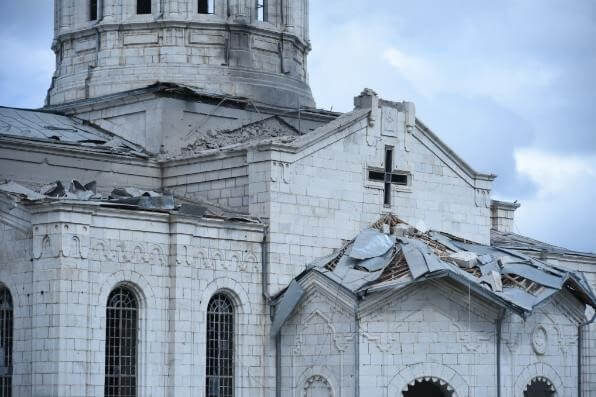
Some of the damage caused to Ghazanchetsos Cathedral in Shushi.
The capture of Shushi was an act of military aggression in a war of terror. It overlooks and dominates the capital, Stepanakert. It was from Shushi that Stepanakert was heavily bombed during the war in the early 1990s, with Azerbaijan firing 400 GRAD missile a day onto the civilian town. Shushi is also adjacent to the only road now available for use from Armenia to Karabakh, via the Lachin corridor. The road is virtually in the suburbs of Shushi, which means that the only access for Armenians from Armenia to Karabakh can be easily controlled.
A fragile peace: territories lost but lives saved
It was with a mixture of relief and concern that HART learnt of the Peace Agreement reached on 9 November 2020 between Azerbaijan and Armenia, brokered by Russia.
The agreement represents a compromise on the part of the people of Nagorno Karabakh and Armenia. It ensures that Azerbaijan commits to no obligations on the future status of Nagorno Karabakh but is accepted in order to prevent further loss of life and destruction, in the face of the overwhelming military advantage of Azerbaijan, and the lack of international support for Armenia.
Peacekeepers
Russia has sent 2,000 troops to Nagorno Karabakh to enforce the ceasefire. Their mission will last for at least five years. The Government of Turkey has also submitted a motion to Parliament, seeking its approval to deploy military and civilian personnel.
Turkey is part of the wider Minsk Group[4] and is considered by most analysts to be a key player in any future settlement. However, Armenians in Nagorno Karabakh have grave concerns about the prospect of being ‘protected’ by Turkish peacekeepers – given the memory of the Armenian Genocide in the Ottoman Empire, recent military attacks and President Erdogan’s continuing commitment to stand with “friendly and brotherly Azerbaijan with all our means and all our heart.” According to the UK Armenian National Committee, Turkey’s involvement would be “akin to Nazi troops delivering ‘peacekeeping’ operations for Israeli Jews.”
During the recent war, hundreds – possibly thousands – of foreign terrorist fighters were deployed as ‘bodyguards’ and ‘custodians’ for the Azerbaijani Army, some of whom were provided with the Azerbaijani national military uniform. Recruitment took place mainly in the Turkish-controlled Syrian territories of Idlib and Aleppo, as well as the Havar-Kilis base on the Turkish-Syrian border. We have seen no guarantees that these ‘bodyguards’ or ‘custodians’ will not be deployed as peacekeepers.
Unsupervised investigations
Following the ceasefire, Azerbaijan announced an investigation by its own government-controlled prosecutors into alleged war crimes committed by both sides during the conflict. However, international observers have serious misgivings over the partiality of such an unsupervised inquiry. As Human Rights Watch said (Daily Telegraph, 26 November): “Azerbaijan does not have a great track record of investigating itself.”
For example, there are fears that Azerbaijan could claim that alleged actions took place on territory belonging to Azerbaijan; that individuals were citizens of Azerbaijan and therefore subject to the laws and courts of Azerbaijan – in explicit defiance of the international community’s categorisation of Nagorno Karabakh as a ‘disputed territory’ and of the UN Charter and Universal Declaration on Human Rights, which grant protection of human rights to persons living in a disputed territory, as to any person living anywhere. Such an approach would also ignore the definition of genocide as pertaining to attacks on individuals because they are of a different and specific race or ethnicity.
Other concerns about the partiality of an unsupervised inquiry:
- The methods and terms of reference may differ from international standards, discrediting the very concepts of human rights, war crimes and accountability.
- The findings of the investigation could be used to stir up hatred or quoted for propaganda purposes.
- The findings could also be used to encourage or justify maltreatment of detainees or prisoners, such as torture to extract ‘evidence’ or bringing them to trial as a bargaining tool in ‘peaceful negotiations’.
It is therefore essential that any investigations into alleged war crimes are carried out by a properly constituted, neutral and recognised international body.
Dadivank monastery
We share widespread concerns over the fate of thousands of Armenian Christian monuments and cultural heritage sites, some of which are more than 1,500 years old, which are now under Azerbaijan’s control. As Professor Igor Dorfmann-Lazarev, an expert on Armenian history and culture at the School of Oriental and African Studies in London, told The Sunday Times (22 November 2020). “We’re talking medieval churches, monasteries, cemeteries, all the things that comprise a people’s culture… They have ripped out [the Armenians’] identity.”
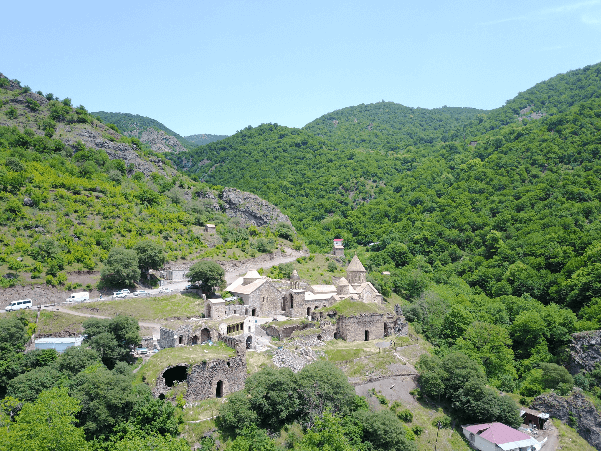
Dadivank Monastery pictured from above during HART’s 2019 visit to Nagorno Karabakh.
We visited Dadivank Monastery – one of the most beautiful of the many ancient Armenian monasteries in Nagorno Karabakh – on the penultimate day of Armenian ownership before it was handed over to Azerbaijan.
The monastery was built between the 9th-13th centuries on the site of a shrine believed to be the burial site of Saint Dadi. The monastery fell into decay in the Soviet era and was badly neglected when handed to Azerbaijan in the 1920s. Only since Armenia reclaimed the area in 1994 has the Monastery been restored.
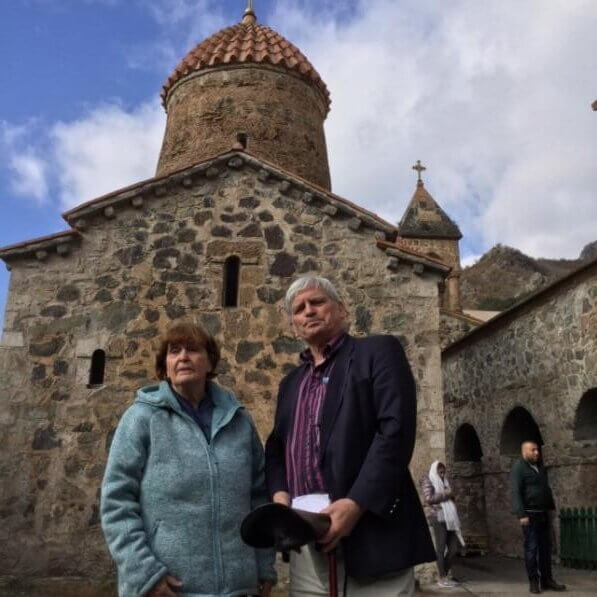
There are concerns among the local population that, because of the terms of the recent Peace Agreement, Dadivank Monastery will come under Azerbaijani control. Under Azerbaijani law, religious symbols are only allowed inside places of worship, and a religious institution can only exist if it is registered. It can only be registered if it has more than 50 active members. If there are no longer any Armenian inhabitants in this area, the very existence of this site of global historic, cultural and religious importance will be under threat.
Although there is some hope that the Monastery will survive whilst under the protection of Russian peacekeeping forces, we witnessed local people removing ancient icons, which will be taken to Armenia for preservation, even digging up earth and gravel from the courtyard floor and placing it into plastic bags. They feared that this could be their final visit to Dadivank.
We asked Father Hovhannes, of the Monastery, to share his primary concerns. He replied: “We want justice. Pray for justice.” He also lamented the lack of support from the global Christian community: “No Christian has visited me or written to me. I have been left totally alone. I understand it is difficult to visit Karabakh when a war is raging. But, surely, they could have contacted me, sent their support, told me they stood with me. Surely picking up a phone is not as difficult as going to a war. There was panic when Azeri targeted civilians. These are terrible days. But all Christians are silent.”
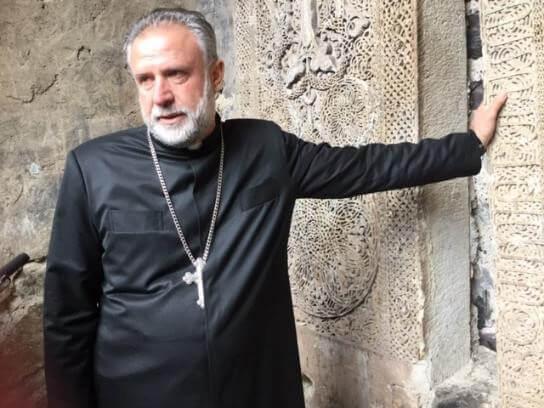
Father Hovhannes and an 800-year-old Armenian Cross-Stone, fearful it will be destroyed by Azerbaijan.
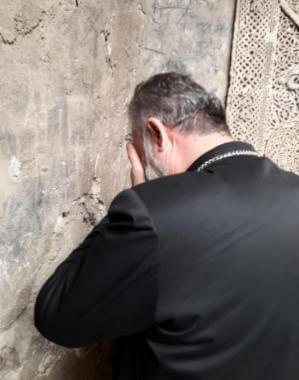
Father Hovhannes grief-stricken by abandonment by international Christianity.
‘Three weeks and thirty years’
The Government of Azerbaijan claims to have achieved more in three weeks than in 20-30 years of negotiations. Such an assertion represents a total dismissal of any previous commitment to a peaceful resolution.
Since a ceasefire in 1994, numerous measures were proposed by Nagorno Karabakh and the international community to ensure peace along the 160-mile Line of Contact – where opposing military forces were permanently situated in close proximity – including a stronger presence of international monitors and the withdrawal of snipers. These measures were rejected repeatedly by Azerbaijan.
The current outcome is not a ‘win’ for the people of Azerbaijan. President Aliyev’s regime has one of the world’s most appalling human-rights records and maintains rigid control of political and civil society, severely curtailing freedoms of association, expression and assembly. Other human rights problems persist in Azerbaijan, including torture and ill-treatment of prisoners in custody, undue interference in the work of lawyers and restrictions on media freedoms.
Role of the UK
The UK is one of the largest investors in Azerbaijan and the third largest exporter – in the same league as Russia and Turkey. There are currently more than 450 UK companies doing business in Azerbaijan, including 400 British oil and gas companies. Total trade in goods and services between the UK and Azerbaijan was £1.1 billion in 2019.
UK-Azerbaijan relations are regarded by Whitehall as an economic necessity, especially post-Brexit. However, there are serious concerns over the UK’s inability to balance these economic interests with human rights considerations.
While the UK Government repeatedly called “for both sides to work towards a peaceful, political resolution to the conflict”, it chose not to intervene to protect civilians in Nagorno Karabakh, irrespective of Azerbaijan’s severe military aggression and breaches to international humanitarian law. It also denies the presence of Syrian mercenaries[5] and claims to have “not seen any signs that ethnic cleansing is taking place or that genocide is a possible outcome.”
During HART’s visits to many countries over the past 15 years, it has become increasingly clear that respect for British foreign policy has haemorrhaged. Local people look to the EU and UN but no longer expect assistance from the UK to defend their freedoms and human rights.
HUMANITARIAN AID
Support for our partners in Nagorno Karabakh
The Lady Cox Rehabilitation Centre is an internationally recognised ‘Centre of Excellence’ in Nagorno Karabakh. The health facility provides hope and healing to over 1500 patients every year. Its inspirational staff, led by the Centre’s Founder and Director Vardan Tadevosyan, are helping to break the stigma of disability prevalent throughout the former Soviet Union. Therapeutic services include physiotherapy, speech therapy and occupational therapy, as well as a state-of-the-art hydrotherapy pool and a new Day Care Centre for children with autism.
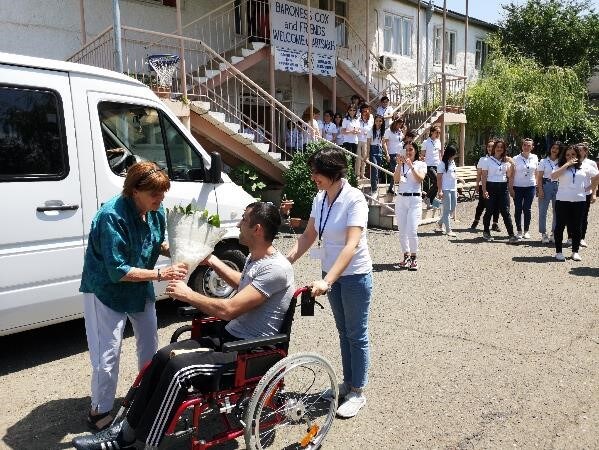
Baroness Cox being greeted by a patient of the Centre on a visit to Nagorno Karabakh in 2019.
The Government of Nagorno Karabakh provides the main funding for the Centre. HART’s support contributes towards staff costs and the wider availability of medicines and effective therapies.
Whilst the Rehabilitation Centre remains evacuated, we are pleased to report that the building itself has not been seriously damaged. Unlike hospitals in the region, the Centre was not hit by recent bombardments.
We are also pleased to report that Vardan is safe and well, although emotionally he has suffered greatly. He, alongside three Rehabilitation Centre staff members, remained in Stepanakert throughout the conflict. Together they helped to treat and care for those injured by the indiscriminate bombing of civilian areas and aid other medical professionals in the city.
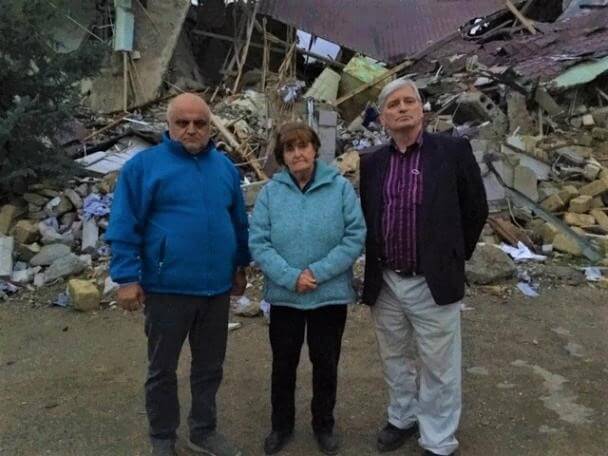
Vardan, Baroness Cox and David Thomas survey the damage to an electrical power station in Stepanakert. Civilians hiding in basements were without heat and light.
Vardan joined his team in Yerevan to help to co-ordinate the continuing treatment of some of the most vulnerable members of the community and has since returned to Stepanakert.
The Centre’s patients with disabilities were all evacuated to Armenia. Unfortunately, as is the nature of rehabilitation, even the smallest delay in treatment can have hugely detrimental consequences for patients. Therefore, the Centre’s staff have been doing what they can to care for them and keep them on track. Staff and patients will begin to return to the Centre soon.
HART is now concentrating on raising funds to care for people with disabilities who continue to be displaced and to help keep Vardan’s team functioning. HART will soon launch an urgent appeal to support the medical needs of 250 patients (medicines, dressings, diapers etc.) as well as the salaries of 25 key staff members. In addition, funds raised will support crucial repair work following the recent attacks. This will involve repairing the two vehicles recently used as ambulances and to evacuate all staff and patients to Armenia, and repairs to the Centre’s blast-damaged windows and medicine fridge. HART will also seek to provide additional funds to displaced people, many of whom do not know whether they have a home to return to.
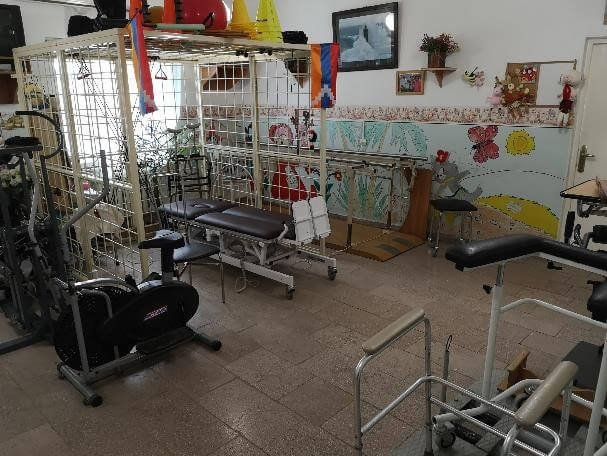
Facilities like the specialist rehabilitation gym were left deserted whilst the Centre remained evacuated by patients; staff are now returning.
Support for the people of Azerbaijan
Our work in Nagorno Karabakh, while primarily focused on aid and advocacy for the Armenian population, also extends to the people of Azerbaijan. For example:
- During meetings with the UK Government, we consistently promote the work of organisations for Missing People, in which mothers in Armenia, Nagorno Karabakh and Azerbaijan work together to try to locate missing family members from the 1991-94 war, and after other smaller conflicts during the past 20 years.
- HART supported the 2008 conference in Stepanakert organised by Vardan, which brought together medical experts and care providers, in order to share skills and good practice about treating patients with disabilities. At first, some nurses from neighbouring counties, including Chechnya, responded to Vardan’s invitation, and shared with Vardan’s team. All wanted to place the care their patients above political passions and divides. Sadly, the Government of Chechnya required the Azeri regime to send the nurses from Chechnya home, before completing their training. They had been very happy at the Centre and grateful that the staff respected their religious priorities, such as maintaining the requirements of Ramadan – and they were very reluctant to leave.
Survivor testimonies
Prisoners of War (POWs)
Despite a ceasefire, we heard multiple reports of brutality inflicted on military and civilian POWs – including torture and beheadings – and claims that equivalent brutalities have been perpetrated by foreign jihadist fighters who receive payment for every Armenian beheaded.
We were told that some perpetrators take over the prisoners’ social media accounts and send pictures of dismembered, decapitated bodies to their mothers and wives. It was our painful privilege to weep with some of these women, as they wait to hear from their husbands, brothers or sons, not knowing what might come to their phone. There is real fear that prisoners are vulnerable to killings, torture, indefinite imprisonment or enslavement in Azerbaijan – as happened during the previous war in the early 1990s.
Their plight is exacerbated by the fact that the Red Cross has been unable to access all POWs. Visits to POWs constitute an important aspect of the Red Cross’ protection activities. It has, from the earliest stages of the conflict, requested access to all prisoners, both civilian and military. But reports of torture of and brutality towards prisoners during the conflict, which the Red Cross would not have permitted if it had access, suggest that the Red Cross has not been granted full access.
Refugees
Early estimates suggest that as many as 100,000 people have been forced to flee. We met refugees being accommodated in church buildings in the town of Saghmosavan, close to the Armenian capital Yerevan. They described their intense suffering caused by loss of loved ones or not knowing their whereabouts, as well as their despair at facing destitution. They have no knowledge of how they are going to survive and care for their families.
During our visit to Nagorno Karabakh, we saw hundreds of vehicles loaded with personal possessions and firewood from trees. Local farmers were herding their cattle and sheep into Armenia. Many had set fire to their homes so they would not be available for occupation by the Azeris.
Knar Avanisyan Varangatagh, 30-years old
My husband, a firefighter, was killed on 30 September during Azeri attacks in the North, in the Mataghis region of Martakert. His body was so destroyed that we needed DNA to identify him. I don’t know what to say to my four children. They asked me this morning about him, and why he has stopped sending money. What can I say?
We hid under trees to escape the UAVs and aerial bombardments, running so fast that I didn’t even have time to get my phone. We escaped in a car, first to the village of Drmbon, then Shushi, then Sevan.
The church has been a life-saver, providing us with food and shelter. But my home is in ruins and I have nothing left. My brother-in-law told me that everything in the village has been stolen or demolished. He was attacked by mercenaries – small groups of special units – who want to take over the soil.
I pray for peace, that I would see my husband again, and for my children to be able to lay flowers on his grave.
Family whose son, an Armenian soldier, was captured by Azeri forces
His phone was stolen by his captors and they posted an image of his beheaded body and sent this to his own social media account for his own family and friends to see.
Angelina, aged 23
On 26 September we had a family party in Stepanakert. The next morning, we woke up to the sound of bombs. I told Aram (aged 13) to get up immediately. My husband (a military doctor) put on his uniform and left the house.
This city was built so beautifully we couldn’t believe they would attack such a beautiful city.
The building next to our home was hit with Smerch. We hid in the basement for four days. We then escaped by car and asked a random house if we could stay with them.
I have health issues so they don’t tell me the truth about what is happening at home. I don’t know. I am worried sick. We just want peace and recognition of Artsakh (Nagorno Karabakh). We don’t want big houses. We can live in small houses. We just want to return to our homes.
Meetings
Armenian President, Armen Sarkissian
President Sarkissian thanked us for “standing with Armenia, Nagorno Karabakh and the Armenian people during these difficult days.” The meeting focused on the Azerbaijani-Turkish aggression against Nagorno Karabakh.
Nagorno Karabakh President, Arayik Harutyunyan
There are parallels with the previous war. But this time, Azerbaijan were supported by Turkey and by foreign Jihadist fighters. We welcome the presence of Russian peacekeepers because the people of Artsakh cannot trust the Azeris. How can they, after all that has happened?
Moving forward, there are no simple answers. No clear roadmap for the future. But our priority is twofold: the security of Artsakh [Nagorno Karabakh] and international recognition of our independent status. This is our hope. And we seek support from friends.
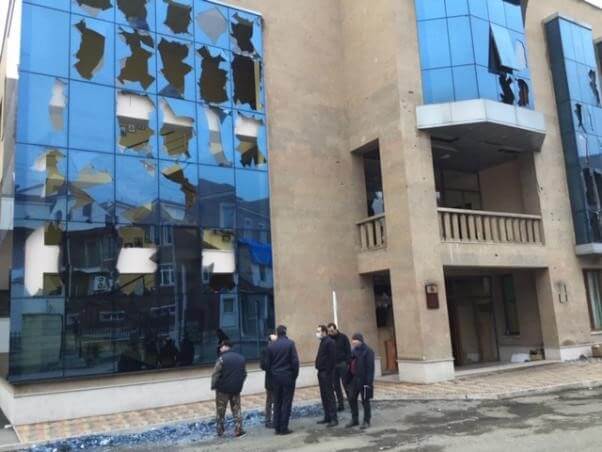
The Music School in Stepanakert bombed by Azerbaijan.
Armenian Human Rights Ombudsman, Arman Tatoyan
Atrocities committed by Azerbaijan and Turkey must no longer remain hidden from the world. For weeks, their military forces engaged in targeted attacks against peaceful populations, including with illegal cluster munitions and chemical weapons. They have destroyed, on purpose, infrastructural objects vital to civilians: gas and water supplies; schools and kindergartens; religion and cultural heritage sites.
As many as 100,000 people have been forced to flee – and still, there appears to be little-to-no concern from the international community. Every family is affected. I know of one mother who has lost all of her sons.
Initiating this war during a pandemic was a crime against humanity. COVID cases have increased because of the escalation of conflict. Doctors now have to treat patients with injuries and with the virus. But Turkey blocked aid to Armenia from the USA (by forbidding air transit across Turkey) which is yet another crime against humanity. Humanitarian assistance eventually came via Qatar, but two days late.
We have video evidence of torture and mutilations. Civilians and POWs are humiliated by their captors. Azerbaijan have returned 29 military bodies and few civilians – DNA was needed to identify four bodies. But it refuses to provide the list of current prisoners (30 now known, but there is likely many more) and continues to withhold information and access to prisoners from the Red Cross.
Jihadists and ISIS-affiliated mercenaries have been deployed against the people of Artsakh. They commit war crimes, with financial incentives, and with impunity.
It is no exaggeration to describe the methods of Azerbaijan and Turkey as ‘terroristic’ in nature. It is a campaign of ethnic cleansing – a genocidal policy – against the people of Artsakh. Their hatred of Armenians runs deep. Hate speech is organised by the Azeri state and promoted in schools, curriculums and textbooks.
One of our main concerns, within Armenia, is the risk of intra-country division. Since the ceasefire was agreed on Monday, anti-Russian and pro-war groups have emerged and are provoking unrest. Many are demonstrating. There is a real risk of civilian clashes, with reports that some Armenians have returned from the frontline with weapons.
Nagorno Karabakh Human Rights Ombudsman, Artak Beglaryan (blinded by a mine explosion in the previous war in the 1990s).
We have evidence of many war crimes perpetrated by Azerbaijan, including the deliberate targeting of civilians, ambulances, hospitals, religious sites, electricity, gas and water infrastructure and the use of chemical incendiaries – possibly white phosphorous. Areas where these were used are now under Azeri occupation so there is a danger of manipulation of evidence.
Preliminary data suggests that 50 civilians were killed. 150 are wounded. 14,000 homes and civilian properties are damaged. Many villages and homes are now under Azeri control. 100,000 people have been displaced. 2,000 hectares of land is damaged. One journalist was killed, and another wounded. 30 civilians have been captured – most have been killed, including some beheadings. Their captors publish photos of inhumane treatment, torture and decapitated heads. Their relatives are desperate for more information and seek an urgent investigation.
We sent this information to the Red Cross. Amnesty International and Human Rights Watch have done limited work, but we have received no adequate replies from major aid organisations. We’ve had no help from the UN, nor the EU. The success of the humanitarian corridor is now dependent on Russian peacekeeping forces. There is no punishment for Azerbaijan for atrocities in this war or the previous war. We are totally isolated.
Armine Aleksanyan, Deputy Foreign Minister, Nagorno Karabakh
Azerbaijan violated multiple ceasefires within minutes. They used weapons forbidden by international law against civilians. 46 kindergartens and 53 schools were damaged. Foreign terrorists, recruited and deployed by Turkey, beheaded civilians. Even today, subversive groups are entering our villages and towns. One grandma was captured and beheaded.
An estimated 150,000 people were targets of Azerbaijan and Turkey, with significant political and military help. [Re. 1915 Armenian Genocide] President Erdogan declared that it was time to complete what was unfinished 100 years ago.
The world watched and did nothing. International organisations did nothing to prevent the suffering of civilians. They responded with indifference and inaction. Shame on everyone who watched daily killings of civilians and did nothing to help in any tangible way. Action was needed but nothing was done. Even with all the reports in the international media, the world did nothing to protect the value of human life. Azerbaijan and Turkey now know they can continue crimes against humanity with impunity.
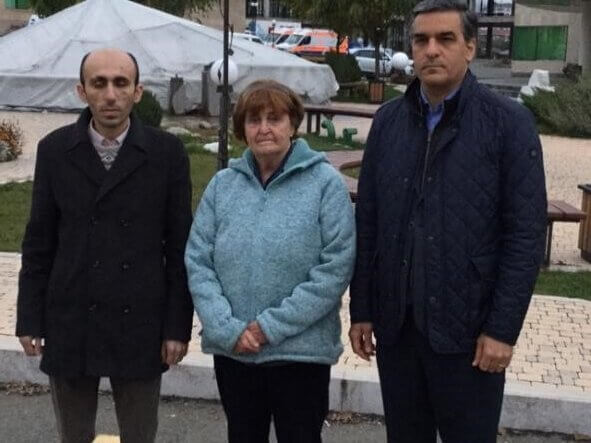
Baroness Cox alongside the Human Rights Ombudsmen for Armenia and Karabakh.
CONCLUSION and Recommendations
The scale and ferocity of Azerbaijani-Turkish military offensives – including targeted attacks against hospitals and churches, cases of torture and atrocities, reports of the use of cluster bombs and the recruitment of foreign jihadist fighters – has intensified the justifiable fear among local people of the possibility of ethnic cleansing from their historic land.
It is, they believe, a concerted and continuing War of Terror, exacerbated by an escalation of state-backed anti-Armenian rhetoric.
There is now an urgent need for all relevant international authorities to bring to justice those responsible for such war crimes and to respond to the century-long call for self-determination by the people of Nagorno Karabakh: to enable them to decide their own governmental arrangements; and to support their high standards of democracy, gender equality and human rights. There must be no impunity for the most serious international crimes.
All of those whom we met in Nagorno Karabakh expressed dismay and anger at the lack of meaningful support from the UK Government and the wider international community. The presence of Russian peacekeepers provides short-term relief. But a cloud of uncertainty hangs heavy over civilians.
Their priorities:
1. Self-determination: The Armenians of Nagorno Karabakh are engaged in a process of their independence on an equivalent legal basis as Azerbaijan in 1991. They have sufficient evidence to claim the same right of self-determination as the people of Timor Leste, Eritrea and Kosovo, who were awarded self-determination for suffering comparable attempted ethnic cleansing (see Appendix).
2. No more impunity: There is now an urgent need to end the impunity with which Azerbaijan, supported by NATO-member Turkey, has carried out such systematic, wide-ranging and brutal violations of human rights. To date, neither state has been held to account for its actions by the international community, despite evidence of recent and ongoing atrocities and war crimes.
3. Treatment of prisoners: We watched video evidence of brutality inflicted on military and civilian prisoners, including torture and beheadings, and heard claims that equivalent brutalities have been perpetrated by foreign jihadist fighters who receive payment for every Armenian beheaded. All relevant international authorities must take effective measures to prevent Azerbaijan from abusing and killing these prisoners, whom they have already captured or may capture during the ceasefire evacuation.[6]
4. Humanitarian aid: Over 14,000 civilian structures in Nagorno Karabakh were reportedly damaged or destroyed during 45 days of conflict, including schools, hospitals, roads and electricity networks. Heavy shelling has also caused significant displacement of the civilian population. An urgent plan of protection, economic support and development is needed to create an environment that makes it easier for people to return.
5. Safeguarding cultural and religious sites: There is a deep fear that Azerbaijan will destroy Armenian Christian monuments and cultural heritage sites in territories under its control, including churches and holy crosses as they did in Nakhichevan. The OSCE Minsk Group should define these sites and artefacts (some of which are 1,500 years old) as vulnerable targets and ensure that comprehensive measures are in place for an immediate response to an attack.
6. Suspension of military supplies: American-led NATO, the Russian-led CSTO, and the Government of Israel must suspend the provision of all lethal and non-lethal military supplies and technical assistance to Azerbaijan until Azerbaijan renounces the use of violence against the Armenian Christians of Nagorno Karabakh.
7. Chemical weapons investigation: The use of chemical incendiaries, possibly phosphorus, is extremely dangerous for civilians and livestock. There are photographs taken by reputable sources of people suffering from serious burns and of killed animals. The use of such weapons would ignite the very woodlands to which civilians had been forced to flee. We urge the Organisation for the Prohibition of Chemical Weapons to undertake an investigation to establish whether chemical weapons have been used and to ensure assistance to protect civilians against the effects of such an attack.[7]
Acknowledgements
By Caroline Cox and David Thomas
We wish to record our profound sympathy for all who suffer as a result of this war and our deep gratitude to all whom we met for sharing their experiences and concerns. These include: the Presidents of Armenia and Nagorno Karabakh; the Human Rights Ombudsmen for Armenia and Nagorno Karabakh; members of the National Assembly of Armenia; Zori Balayan and his family, including his son Hayk who had recently returned from the frontline with his injured son; Father Hovhannes and all whom we met at Dadivank; and the refugees in Armenia.
We commend the courage of those on the frontline – a frontline of faith and freedom – who held out for 45 days against Azerbaijani-Turkish aggression.
We pay special tribute to Vardan Tadevosyan, along with his inspirational staff at Stepanakert’s Rehabilitation Centre, who continue to co-ordinate the treatment of some of the most vulnerable members of their community from Yerevan and Stepanakert. Their actions stand as a beacon of hope in the midst of indescribable suffering.
We also wish to express our profound gratitude to Artemis Gregorian for her phenomenal support for the work of HART, together with arrangements for this visit and all our visits. She is rightly recognised as a Heroine of Artsakh as she stayed there throughout all the years of the previous war and has remained since then making a great contribution to the community.
We are grateful for all who endured the pain of sharing their grief and anxieties with such courage and grace.
Appendix: NAGORNO KARABAKH’S RIGHT TO Self-determination
Letter to The Times
On 5 November 2020 The Times newspaper published the following letter:
Sir, Heavy fighting continues to afflict the disputed region of Nagorno-Karabakh, as you report (Oct 29). In his lifetime Stalin rearranged the internal boundaries of the Soviet Union to suit his convenience. For example, he divided north and south Ossetia, and put the Abkhaz into Georgia. Nagorno-Karabakh and Nakichevan he pushed into Azerbaijan, despite the Armenian majority in the former and their historic monuments in the latter. The decisions of this long-dead dictator cannot be allowed to govern the future. The principle of self-determination was what eventually broke up the Soviet Empire. This should guide the future and enable the local people to decide their own governmental arrangements.
The letter was co-signed by Lord Hylton, Lord Alton of Liverpool, Baroness Cox; Lord Griffiths of Burry Port; Lord Curry of Kirkharle, Lord Mendelsohn and the Right Rev Dr Alan Smith, Bishop of St Albans
UN Charter
In the opening chapter of the UN Charter, respect for the right to self-determination of peoples is presented as one of the purposes of the United Nations. This right was confirmed by the UN General Assembly in the Declaration of Friendly Relations, which was unanimously adopted in 1970 and is considered an authoritative indication of customary international law:
By virtue of the principle of equal rights and self-determination of peoples enshrined in the Charter of the United Nations, all peoples have the right freely to determine, without external interference, their political status and to pursue their economic, social and cultural development, and every State has the duty to respect this right in accordance with the provisions of the Charter.
Article 1, common to the International Covenant on Economic, Social and Cultural Rights (ICESCR) and the International Covenant on Civil and Political Rights (ICCPR), reaffirm this right, and lays upon state parties the obligation to promote and to respect it.
Criteria for the Right to Self-Determination
A people can be said to have realised its right to self-determination when they have either:
1) established a sovereign and independent state
2) freely associated with another state or
3) integrated with another state after freely having expressed their will to do so.
The definition of ‘realisation’ of self-determination was confirmed in the Declaration of Friendly Relations. The principle outlines the duty of states to respect and promote the right and the obligation to refrain from any forcible action that deprives peoples of the enjoyment of such a right. In particular, the use of force to prevent a people from exercising their right of self-determination is regarded as illegal and has been consistently condemned by the international community. The obligations flowing from the principle of self-determination have been recognised as erga omnes, namely existing towards the international community.
Defensible borders
The need for the new State of Nagorno Karabakh to have viable defensible borders and economic viability was not an original demand of the people of Nagorno Karabakh; it was a need created by the aggressive and illegal behaviour of Azerbaijan and its allies, exacerbated by a campaign of hate systematically taught, and rewarded, in Azerbaijan. As was said by Amnesty International of the rewarding by the Azerbaijan Government of the murderer of the Armenian officer at a NATO conference during his sleep: “It is clear that in Azerbaijan hatred of the Armenian is not only to be encouraged but is to be rewarded.”
For Karabakh, as for other small democracies, surrounded by authoritarian regimes, territories to protect their heartland are made necessary by the actions of the aggressor. The similar case is Czechoslovakia, which was granted land not obviously belonging to or populated by its people, to establish its viability. Once that additional protective land was surrendered and ‘returned’ to an aggressor, in this case Nazi rather than Turkic, the days for the survival of that democracy were soon numbered. And no-one came to its assistance.
As proof of a similar realistic assessment regarding the only hope of the survival and self-determination of the people of Karabakh, there will be challenges to its viability, in the context of the War of Terror waged by Turkey and Azerbaijan. The Armenians living in Nagorno Karabakh are now left totally surrounded and constantly threatened. The reaction by the UK and other governments to the total contempt with which Azerbaijan and Turkey have shown for international law and human rights will be crucial in forthcoming developments.
Does Nagorno Karabakh fall within the UN remit for the right to self-determination?
Yes. Although Nagorno Karabakh is not internationally recognised as ‘sovereign and independent state’, it is a functioning autonomous democratic state with instruments of state and a viable economy. As per the Montevideo Convention’s requirements of statehood, it has a permanent population, a defined territory and a democratically elected Government. It has eight diplomatic missions in other countries and its Government has numerous contracts with other states and state corporations.
The people of Nagorno Karabakh (94% Armenian) have freely integrated as an autonomous zone looking to Armenia for historical, cultural and political reasons of their own volition as their natural neighbours. They are both geographically and ethnically distinct from the Azerbaijani State under which they officially stand according to international law.
Since 1988, Azerbaijan has violently sought to re-establish its authority and control against the wishes of much of the population of Nagorno Karabakh.
Resolutions by the General Assembly and Security Council cannot supersede or overthrow the Charter of the UN, its declarations, or the principles underlying them. General Assembly and Security Council resolutions are formed merely to address time-relevant political priorities. The Charter and Declarations stand above resolutions until they are changed. Resolutions cannot supersede the Charter of the UN.
In addition to the UN Charter of Nations, Nagorno Karabakh scores highly on all the Indicators of social development established by the World Bank that measure how ‘developed’ a country is. These include statistics compiled in the following fields of civil life: education; health; work; gender equality; peacefulness; democracy; corruption; consumption; pollution; leisure/ media; civil rights; and crime / social unrest. In all these indicators, Nagorno Karabakh scores significantly higher than Turkey and Azerbaijan.
[1] Exact numbers are not yet known. It was reported on 9 November that 54 Armenian civilians had been killed and 163 wounded, though this figure may well be higher. Thousands of Armenian soldiers have reportedly died in the conflict.
[2] Following the 1915-23 Armenian Genocide, the international community had come to understand there was no legal means to bring to justice persons guilty of crimes against other nations. The term ‘genocide’ did not receive international recognition until 1948. After World War Two, there was a determination that the holocaust against the Jewish People should not be forgotten in the way that the Armenian Genocide had been forgotten and denied by some. So followed the Universal Declaration of Human Rights, the setting up of the UN, the UN Charter, the Genocide Convention and, later, the Declaration of Friendly Relations defining the right to self-determination. In 1998 the Rome Statute established the International Criminal Court.
[3] Recent Azerbaijani-Turkish military offensives should not be regarded as a simple geopolitical adjustment, returning to Azerbaijan what was rightly theirs but taken away during the 1991-94 war. The taking over of those territories – some largely uninhabited, others inhabited at the time by a mainly-Azerbaijani population – were the direct result of actions by Azerbaijan, supported in the earlier stages by the Soviet Union. It is essential to remember that Armenians have suffered pogroms, after ethnic cleansing and genocide, through 100 years prior to the war of the 1990s, sometimes at the hands of Turkey/the Ottomans, sometimes at the hands of the Azerbaijanis.
[4] The Minsk Group, the activities of which have become known as the Minsk Process, spearheads the Organisation for Security and Co-operation in Europe / OSCE’s efforts ‘to find a peaceful solution to the Nagorno Karabakh conflict’. It is co-chaired by France, Russia and the United States. The Group’s permanent members are Belarus, Germany, Italy, Sweden, Finland, and Turkey, as well as Armenia and Azerbaijan.
[5] The UN Office of the High Commissioner for Human Rights recently cited “widespread reports that the Government of Azerbaijan, with Turkey’s assistance, relied on Syrian fighters to shore-up and sustain its military operations in the Nagorno-Karabakh conflict zone, including on the frontline. The fighters appeared to be motivated primarily by private gain… In case of death, their relatives were reportedly promised financial compensation and Turkish nationality.”
[6] Azerbaijan is a signatory to the European Convention for the Prevention of Torture and Inhuman or Degrading Treatment or Punishment.
[7] As a signatory to the Chemical Weapons Convention, Azerbaijan has committed to ‘never under any circumstances’ use chemical weapons, nor engage in any military preparations to use chemical weapons.
